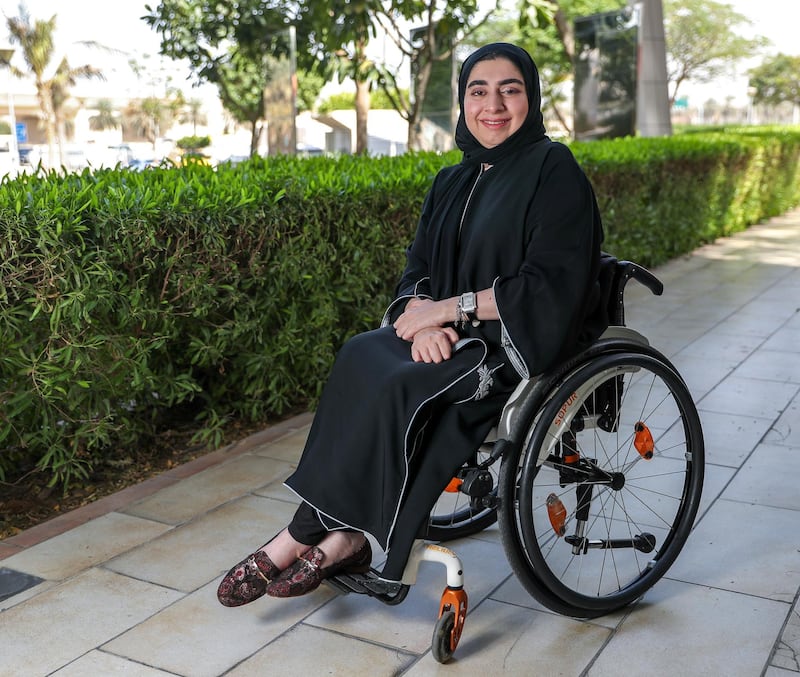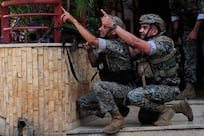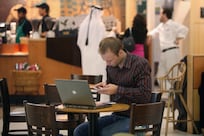You might have seen me rolling around Zayed University, the malls, the beach or different parks. I say rolling because I come with a white-framed wheelchair and LED wheels that glow in the dark.
But you can save the pitying "meskinas" because I am happy with who I am. The old me that loved to be spontaneous, play around, get dirty and occasionally get hurt – I had to let her go out of necessity. War does that. It forces us to make choices and leave the things we hold dearest behind. The war I experienced was not manmade but one of biology. It was a battle my body waged against itself and forced me to adapt. This conflict resulted in me falling and tripping continuously until one day, my feet couldn't carry me, despite the strength they possessed. My parents thought my shoes were the problem so they got me new ones but my legs continued to falter and then my hands followed the same path.
The problem was a condition called chronic inflammatory demyelinating polyneuropathy, which is a rare neurological disorder that my body suddenly developed when I was nine years old. Sometimes I feel I lost more than the ability to walk. I lost myself. Everything that once defined me – my nationality, religion, sex, interests, goals, hopes and dreams – all faded to the one thing that everyone immediately identifies with me, the wheelchair. Yet the same wheelchair that replaced the legs that once gave me mobility and provides me with a modicum of independence has rendered me virtually invisible in the eyes of the world.
That invisibility blankets every aspect of my life and is a constant source of frustration that I navigate daily. I’m commended for wearing a shayla and abaya – as if I suddenly ceased being an Emirati, proud of her cultural heritage, when my legs stopped working. It bothers me that I have to work twice as hard to prove my worth or to be taken seriously. For instance, my efforts to search for an internship and possible employment are often met with confusion, surprise and outright scepticism. Why do I have to lead with the fact I have a GPA of 3.7 to be taken seriously at a job fair? Why can’t they trust that I am just as capable of doing the same work as my peers and stop assuming my physical limitations are synonymous with my intellectual capacity?
Even after my GPA is established, I often have to go through another layer of vetting as they figure out what I might be capable of doing. I often wonder whether I will ever be enough, or will I have to keep proving myself over and again to fight the wheelchair effect?
__________________________
Read more from Opinion:
Rashmee Roshan Lall: The only predictable thing about North Korea is its unpredictability
China’s ambitions leave Pakistan out in the cold
__________________________
Public perception is one thing; public access is another. Recently the advocacy group Wings of Angelz organised a Ramp Day, where members went around Dubai identifying public spaces that were not wheelchair accessible. Access is never an easy thing. Most people can’t imagine what it feels like to be denied access to a certain place, for reasons beyond their control.
A federal law on accessibility was introduced in 2006 but is not always enforced. My enthusiasm for being in public places is not always matched by the options of getting there. The cinema poses difficulties; so do old buildings. However, the number of new buildings in Abu Dhabi where I live that do not have adequate access is quite incomprehensible. It affects my choice of where to work and hang out. Wheelchair access on pavements can be tricky; some have slopes to make it safe to cross the road but others lack a decent slope, which forces the wheelchair user into a dangerous and even life-threatening situation. Wings of Angelz believes complete access to anywhere is every person’s basic right. In an attempt to help Dubai reach its goal of total inclusivity, it has helped countless wheelchair users by building more than 750 ramps in the last couple of years.
Still, being confined to a wheelchair is not something that I feel warrants pity. I don’t ask to be treated in a special way. In fact, the next time you decide to be extra nice, fake nice or even careful with your words, please don’t. After years of being bound to a wheelchair, people do not realise it has become a crucial extension of my physicality, a substitute for my legs. I take care of it as if it were part of my body. I check for loose screws and clean it on a regular basis to keep it working. Yet I have had fellow students put their feet on the wheels as if it was some type of object. Just as there is an etiquette on how to eat and act, there is an etiquette on how to behave with a person with a different ability.
However, the wheelchair can be quite handy sometimes, particularly when I want to avoid being bothered by salesmen in stores and can hide behind tables.
Change is a necessity and part of life, as we are either moving forward, backward or improving but we are never stagnant as we are always in motion. The wheelchair is not a source of frustration but people feeling constantly bad for me because of the chair can be annoying.
Society has a low standard for people who are different in any way. Their eyes fill with sadness, sympathy and curiosity as they utter the word "meskina", which means poor thing. But I will not let their preconceptions determine my destiny, so please don't "meskina" me. As hard as it is to live in a wheelchair, it is not impossible and neither is it miserable. I am very happy and contented with my life and I am constantly striving to be the best version of myself. The stereotypes that are associated with life in a wheelchair as sad or depressing must be shattered. All in all, my life is pretty amazing and I expect it will only get better as I apply myself to my goals.
In a few short months, I will graduate with a degree in international studies with a focus on international affairs and a minor in communication and media sciences. I want to pursue a masters degree in public policy and develop my blog, which aims to create a new social wave of normal, one where you are not defined by anything except what you contribute to society. I also aim to fly around the world and discover new cultures and traditions as I shatter stereotypes about able people like me. Moreover, I plan to start a foundation that helps people with different abilities in developing countries where accessibility is very low and access to adequate healthcare is poor.
I don’t think there is an avenue I can’t explore because when I have my mind set on something, I always work towards achieving it.
Being ordinary is overrated. Sure, the ability to be extraordinary might take a few bruises, punches, sweat, sleepless nights and sometimes tears but the rewards of greatness are well worth the challenges. Those same challenges have catalysed my need to redefine the word “normal”. We all possess resilient souls but will never tap into those reserves unless tested by chasing our dreams and perhaps falling short. Falling has been one of life’s greatest gifts since it has shown me time and again just how capable I am of getting up and dusting myself off. I wouldn’t trade a thousand legs for the wisdom I have gained on this journey.
Above all, I’ve learned the only thing that can restrict me on life’s journey is me – and only me.
Noura Alblooki is a Zayed University student





